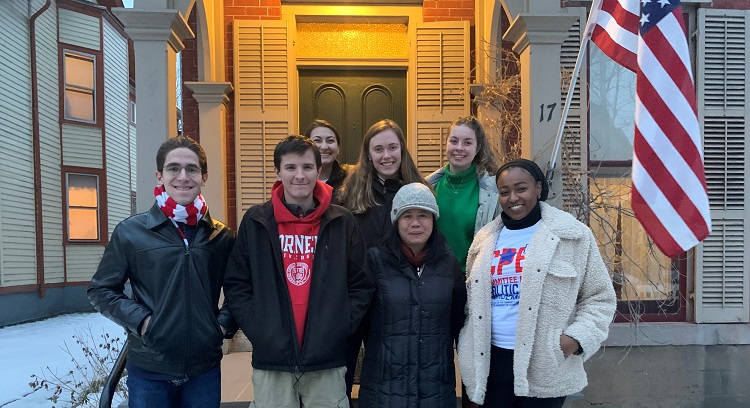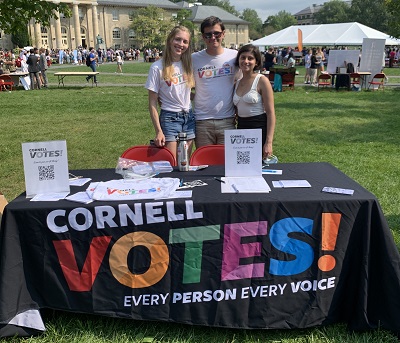Spotlight on Student Organizations: Cornell Votes
Cornell Votes membership has ballooned over the past two years. Having taken several forms over the years, the current organization was founded in the summer of 2020 by five students and now numbers over 100 members.Cornell Votes members are dedicated to increasing civic engagement on campus, it is a priority to “get every Cornellian as involved as possible,” says founding member and President Patrick Mehler.
Lauren Sherman, current member and incoming Vice President of External Operations, agrees. “The youth has so much power, and we just don’t use it. We need to stand up for what we think is important.”Cornell Votes is organized into three departments: Community Engagement, Coalition, and Communications. Each department serves a unique purpose all supporting the Cornell Votes mission to, institutionalize and create a campus culture in which every person exercises their right to have a voice in their representation through voting, democratic engagement, and civic discourse within the Cornell University ecosystem.
Community Engagement members focus on voter registration, absentee ballot assistance, poll rides, and the like. They partnered with University leadership to make voting information available at on-campus Covid testing sites and in Dining facilities. The Coalition Department builds relationships with student organizations on campus – currently over 100, local and national organizations, and students at other universities looking to get their own, similar groups off the ground. And the Communications team develops informative, coordinated social media and email outreach – which was particularly important when in-person engagement was not possible.
Housed within the David M. Einhorn Center for Community Engagement as a university-sponsored student organization, Cornell Votes organization is non-partisan. This is important to Patrick who was not previously politically involved. “I was a big believer of the non-partisan aspect, where we could be upfront and honest about what inclusion means: everybody. It does not matter where you vote, how you vote, who you vote for. It doesn’t mean any of those things. It means are you engaged and are you making your voice heard,” he says.
“The ultimate inspiring thing for me is that it is a wildly untapped population in terms of people getting their voices heard, a huge group who, in my experience, is not apathetic but frustrated with how complicated it is to typically vote. And I thought the answer to that was to do something, and I thought this was a good avenue to bring people together and make the process as easy as possible help people get their voices heard.”
Lauren has been involved in partisan politics since high school, and she, too, was inspired to join Cornell Votes because of its non-partisan orientation. “I wanted to do more non-partisan getting people out to vote. I enjoy the partisan work, but I really think we need to get more people out to vote, especially given the voter suppression and threats of more over the past several years, and the response to it. I wanted to actually get my hands dirty and support the effort.”
"For me, it is so exciting to see how eager students are to make sure their voice counts. The enthusiasm I see when people reach out with registration questions or asking how they can help Cornell Votes inspires me to keep growing our reach," says Dana Karami '23, Vice President of Operations.
Accordingly, Cornell Votes makes an effort to engage all Cornellians, inclusive of people who can and cannot vote in US Government elections. The organization’s Executive Summary reports that in 2020, 18.7% more Cornellians voted in the federal election than in 2016, bringing Cornell’s voting rate above that of the national average. Cornell Votes is also involved in Student Assembly elections and counts among its successes a 33% increase in voter turnout in Spring 2021 compared to the previous undergraduate student body elections, and a 31% increase in Fall 2021 elections compared to Fall 2020 elections among first-years and transfers. "We are so proud of the voting rate increases we have seen not only because it means more Cornell Votes is reaching students, but more so because it means more Cornellians have a voice in their government," says Dana.
There is always an election to be organizing around, and “there are lots of ways to be civically engaged besides voting,” says Patrick, and, often, this work lays the groundwork for big election years. For example, Cornell Votes was actively involved in advocating for on-campus polling locations in Albany, a law which Governor Kathy Hochul has since signed into law. On November 8, 2022, Cornell students can vote at Alice Cook, thusly reducing access and transportation barriers to student’s enfranchisement. Students living in Barbara McClintock Hall and the Hasbrouck townhouses off Pleasant Grove Road vote at BOCES (Boards of Cooperative Education Services) on Warren Road. Next, Cornell Votes would like to see a Civic Holiday signed into law by the state or federal government.
Cornell Votes prioritizes peer-to-peer outreach and connects with affinity groups and other student organizations on campus. Patrick says, “We do have some people in Cornell Votes who cannot vote in this country, and those are some of our best ambassadors because they can say, ‘even if I can’t vote, it’s important that we all get involved.’ The chance that a random person or politician can get you to vote is really low. You’re more likely to listen to your friends, peers, people you look up to. And when those people are engaged in the process, it is getting more votes out.”
Turning out the mid-term vote has been a major focus this semester. Members helped students register to vote and access absentee ballots. Cornell Votes is now focused on the early vote, October 29 – November 6, for those voting locally, and on Election Day, November 8. “What really matters is getting your voice heard," says Lauren. And Cornell Votes exists to assist.
As for future goals, institutionalization is chief among them. Members would like to see voting information integrated into required student and employee paperwork, as well as a day of service and civic engagement. As Lauren plans her assent into a leadership role, she lists goals this way: “I want to continue to grow our club and membership. I want to continue to increase our vote share at Cornell in the upcoming years, and I’d like to find new ways to encourage student involvement and engagement in the civic process.”
“Be engaged, you can’t afford not to be, and we’ll make it as easy as possible for you to do that,” says Patrick.


